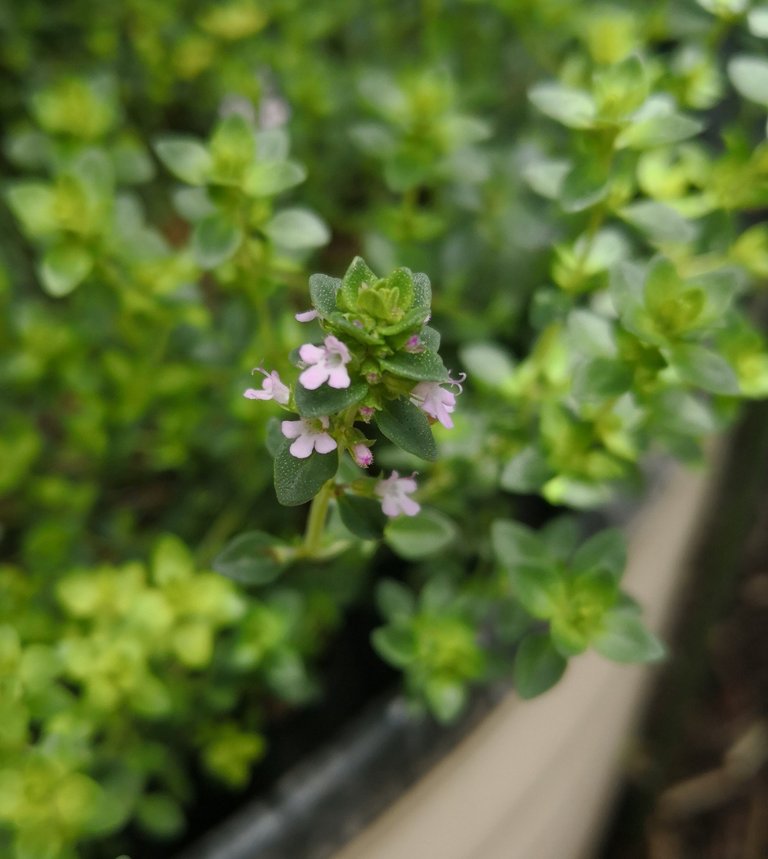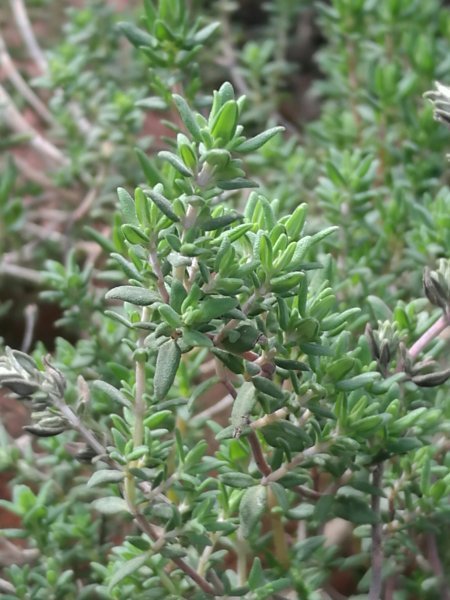Garden Herbs - Thyme
Hi Herbal Hiveans. Here's the next in my new series of posts covering how to use the herbs in our garden. You can find the earlier ones by wandering back through my blog. Once I've quite a few, I'll make an index page for them for your ease of use. This installment is about Thyme

Common names: Thyme, Common Thyme, German Thyme, Garden Thyme
Taxonomic name: Thymus vulgaris
Family: Lamiaceae
Uses: Sore throats, colds and flu, internal and external infections
Area of origin: Mediterranean
Warnings: None
Thyme (Thymus vulgaris) is one of the herbs that we immediately think of when thinking of cooking. It’s another of the amazing Mint family (Lamiaceae) and is a close relative of Marjoram and Oregano. There are many species and cultivars related to the ‘original’. As long as you can get that great Thyme smell from them, they will be beneficial in the ways covered on this page.
Thyme gets its kitchen reputation from its wonderful taste and its traditional use as a meat preservative (many of our favorite kitchen herbs were used to preserve meat, long before refrigeration became the norm).
Thyme’s amazing properties can all be traced to an oil that it contains called Thymol. This oil has the ability to kill many infective organisms in any part of our body, how it works best for each case is more a feature of the method of preparation. Thymol can be rubbed externally, drunk, inhaled, taken in capsules, used in teas, ointments and creams.
Looking at its other properties, we can see that Thyme is a warming herb, useful in conditions that feature cold, chills, stagnation and decay that results from this lack of warmth and movement. That’s the key to it’s properties that help our digestion that’s also why it’s such a popular kitchen herb.
It is effective in moving fluids through tissues that are afflicted with cold and will open pores in the skin to allow this fluid to leave as perspiration.
This moving property helps to thin mucus that has been thickened by lack of movement and stagnation. If we add to this it’s ability to kill infective organisms, we can build the picture of Thyme being an excellent herb to reach for when we have respiratory issues caused by infections, especially those with thick phlegm and chills. The Thymol is easily inhaled into the respiratory tract as steam or an essential oil. Here it acts directly on the mucus membranes, killing infection and thinning mucus.
If you’ve read any of the other write ups I’ve done, you may be able to see that different herbs are useful for ailments often generically lumped together as ‘colds and flu’, but having subtle differences for which a specific herb can be more effective than another. Whether the cold has chills or not, the type of mucus, the type of cough, fever and sweat all point to different herbs.
This is where industrial herbalism and many of these ‘silver bullet’ articles that proclaim one herb as being good for all colds and flus can lead you to waste your time and money and, worse, lose faith in the effectiveness of herbs as remedies.
The psychological effects of Thyme are fascinating and worth a look too!
Thyme gets deep into our body and moves fluids and warms tissues, releasing many things that it helps our bodies dredge up. It acts similarly on our minds. It aids sleeplessness due to dreams that result from problems in our unconscious, it helps to release these energies from deep down and improves sleep by easing their passage.
Aren’t herbs wonderful things? How many of us, seeing Thyme in someone’s kitchen, would have thought of it as being helpful with such deep issues?
This leads us to Thyme being a relaxant for our parasympathetic nervous system. This can be seen in its effects on dreams, an excess of which come from a tension in that system. As with some other herbs in the Mint family, Thyme is useful for people who just can’t relax.
In the senses that we’ve looked at Thyme, we can see how it is a most wonderful herb for respiratory ailments, it kills bacteria, clears phlegm, eases breathing through its effects not only on the tissues but on the nervous system itself. It can aid in sleeplessness that comes from with the flu. I think that ticks most of the boxes!

Making a tea from this herb
To make tea, simply place a teaspoonful or two of dried or fresh herb into a cup of hot water. Cover the cup while the brew steeps so that you don't lose any of those precious oils.







Aint that the truth!!! I tend to ask now: 'what's the colour of the mucus?' 'is it a dry or wet cough' and so on until I narrow it down to a few herbs.
What you say about thyme and sleep is amazing! That makes so much sense to me and I love the idea of it releasing mucus AND releasing those deep down energies preventing us from sleep! Enjoyed this a lot, thankyou!
Glad you liked it! The commonest herbs are with us because they're the best. The specificity of symptoms makes it easier to choose the right herb for the job.
No wonder. Many of my favorite foods are "soul foods". Mashed potatoes, gravy, chicken, hot greens. In the southern cooking style, these are usually heavily herbed. Maybe the thyme is what calms me, and reminds me of good home cooking memories. I always add thyme sprinkled over biscuits before baking them, and the aroma is amazing.
good, home cooked food, just like mother used to make...yum!
My poor thyme plant is very undernourished and under used. It's clinging to existence in a forgotten corner of my garden and I find it fiddly to harvest, which doesn't help usage wise.
it needs tlc and beauty
This was so extensive and enlightening for me. I will never look at my Thyme plant the same way and will have to learn more about using my herbs for medicinal benefits. Thank you for this amazing information.
no worries!
There are a few other herbs back in my blog that might interest you
!hivebits
And so I must plant some thyme! I am so grateful for your posts as a new farmer and someone looking to heal her body without necessarily administering pharmaceutical toxins in it.
Reblogged to more people ✨
glad you like the info! there are other herbs posted previously on this account that you may like to check out.
I have seen a few... and I appreciate :)
if you want to check out a lot more stuff our full website is https://ligayagarden.online
I grow thyme here, but it only just survives the winter, maybe. I bet most died this winter as the weather's been so odd.
Weather has been odd this year. Maybe if we protect our thyme a little better it will make it, though your weather gets far colder than ours.
!hivebits